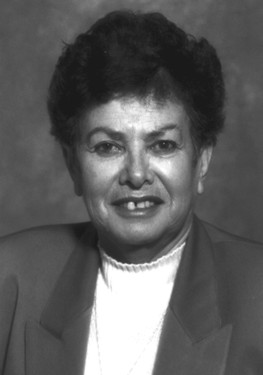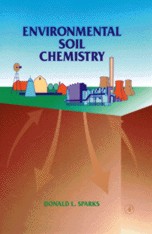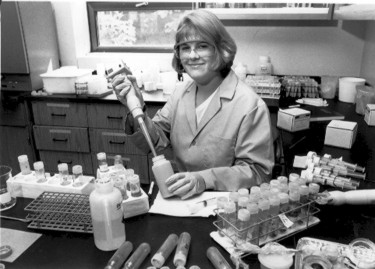December 1995/January 1996 Volume 4 Issue 3 Visiting Researcher From Israel to Collaborate In Soil Science  Dr. Sala Feigenbaum, an Israeli soil scientist, is a visiting researcher in the department of plant and soil sciences, from Nov. 1 through February. Feigenbaum, whose research interests include the chemistry and fertility of potassium and nitrogen reactions in soil, will be collaborating with Dr. Donald Sparks, distinguished professor of soil science and chair of the department. Dr. Sala Feigenbaum, an Israeli soil scientist, is a visiting researcher in the department of plant and soil sciences, from Nov. 1 through February. Feigenbaum, whose research interests include the chemistry and fertility of potassium and nitrogen reactions in soil, will be collaborating with Dr. Donald Sparks, distinguished professor of soil science and chair of the department.
Feigenbaum is the author of numerous scientific papers and has co-authored several articles with Sparks that have appeared in the Soil Science Society of America Journal and Irrigation Science. "Dr. Sparks and I knew of each other's work through the scientific literature," Feigenbaum says. "We then met in 1983 when I was on sabbatical in the United States and collaborated on our first joint project in 1987." "It is a pleasure to have Dr. Feigenbaum spend a sabbatical leave in our department," Sparks says. "Our faculty, graduate students and postdoctoral asssociates will greatly benefit by interacting with Dr. Feigenbaum. She is a first-rate scientist who has had a long and distinguished career at a world-class institute in Israel. During her stay at UD, Feigenbaum will be conducting research on the role of potassium on the exchange reactions of sodium and calcium in soils. Such research will be useful in understanding how the composition of irrigation water affects the chemistry of soils, particularly saline soils that receive inputs of brackish water. Saline soils are found globally, including the western United States and the Middle East. Born in Poland, Feigenbaum emigrated to Israel and completed her doctorate in soil science at Technion Haifa, Israel Institute of Technology. She is employed at the Institute of Soil and Water, Agricultural Research Organization. Her career, which spans more than 30 years, has included positions as visiting scientist at the International Atomic Energy Agency in Vienna; the Institute for Agriculture Buntehof in Hanover, Germany; and the University of Giessen, Germany. She was a fellow at the Soil and Irrigation Institute in Pretoria, South Africa, and spent a sabbatical at Washington University in St. Louis, Mo. 
Sparks Authors Soil Chemistry Text Writing a textbook is one of the most exciting challenges in a professor's life. Dr. Donald Sparks, distinguished professor of soil science and chair of the department of plant and soil sciences at the University of Delaware, has recently completed and published a text, "Environmental Soil Chemistry," with Academic Press, Inc. The nearly three-year process called for lots of discipline, dedication and editing, he says. "I began writing the book in March of 1993--although several months earlier I already had begun mentally preparing chapters," he explains. Sparks, a serious and focused individual, says he worked best by plunging into his writing at 8 a.m. and working, essentially without a break, until 5 p.m. for two or three days each week. At this pace, the writing took 18 months to complete. He gave the manuscript a test-run with students in his Environmental Soil Chemistry course. By using direct feedback from students, Sparks made modifications to ensure that the text is user-friendly. The manuscript then was reviewed by eight experts in the field. Finally, he and research associate Jerry Hendricks spent several months checking references and galley proofs before the text was published in October. The 267-page book discusses soil chemical processes and principles and applies them to environmentally important reactions in soils and other natural environments. "It is suitable for undergraduate and beginning graduate students in soil science, environmental engineering, marine science and other environmental sciences, and is also an appropriate reference for professionals in these fields," he says. Historically, soil chemistry has focused on the effect of soil chemical reactions on plant growth and plant nutrition. Beginning in the 1970s, the emphasis shifted to environmental aspects of soil chemical reactions due to an increasing societal concern about contaminants in soils and water. "Fundamental principles are the same," says Sparks, "but the applications are different. A knowledge of environmental soil chemistry is fundamental to understanding and predicting the fate of pollutants in soils and waters, and in making sound decisions about remediation of contaminated soils." The chapters in Sparks's book cover information on inorganic and organic soil components, soil acidity and salinity and on exchange sorption, kinetics and redox processes in soils. The book also contains extensive data on elemental concentration in groundwater, soil, soil-forming rocks, and sediments, pesticide classes, trace element concentrations in sludges, inorganic minerals and humic substances in soils, and methods for decontaminating soils. Supplementary reading lists, sample problems and explanations of terms also are included. Sparks is the author of another book, "Kinetics of Soil Chemical Processes," which is a benchmark in the field. He has edited 16 other books and has written 30 book chapters and more than 100 refereed papers. Undergrad Chalks Up Experience in Research Semester  Erin O'Reilly had the luck of the Irish on her side one warm day last spring in Tennessee. She had just one hour to make it to the airport to catch a plane, but first she had to hand in an important research paper. Somehow, in a blur of activity, O'Reilly accomplished her mission and made the flight home. Erin O'Reilly had the luck of the Irish on her side one warm day last spring in Tennessee. She had just one hour to make it to the airport to catch a plane, but first she had to hand in an important research paper. Somehow, in a blur of activity, O'Reilly accomplished her mission and made the flight home.
It's not that O'Reilly is a procrastinator who rushes around at the last minute to make deadlines. Rather, the pace she kept on her final day at Oak Ridge National Laboratory was similar to the tempo of every one of her 120 days at this world-renowned, multidisciplinary research and development center. O'Reilly, a senior environmental soil science major in the College of Agricultural Sciences, spent a grueling but rewarding spring in the Science & Engineering Research Semester (SERS) program. This prestigious internship, funded by the U.S. Department of Energy, is awarded to undergraduates enrolled in the sciences who show particular promise and potential. "The SERS program was a highly valuable experience," says O'Reilly. "I had the opportunity to interact with some of the best and brightest in their fields. "My own research project at Oak Ridge was an investigation into the toxicity of lithium to an annual plant called arabidposis. Lithium carbonate has a range of industrial applications and is widely used in the United States, so a study of this type can provide valuable data. "However, I had my work cut out for me, taking this project from start to finish in four months," adds O'Reilly. "First, there was the prep time in the library, then the actual experiment, and finally all the analysis and writing. "It wasn't easy, but when I look back I see how much I learned. I feel like I've got a real edge now when it comes to applying to grad school and seeking fellowships." O'Reilly has long been a believer in the benefits of internships. In fact, this transfer student did an internship with the department of plant and soil sciences in the summer of `93, even though she didn't start taking classes at the university until that fall. "At first, with any internship you have to accept that you will be the `resident lab slave,'" says O'Reilly, with a chuckle. "You do your share of washing test tubes but then you move on from there." In the case of O'Reilly's 1993 internship, "moving on" in responsibilities ultimately meant co-authorship of a research article with Dr. Tom Sims. That article is scheduled for publication this winter in "Communications in Plant & Soil Sciences." After her busy semester at Oak Ridge, O'Reilly took a well- deserved break from the lab over the summer. Of course, for O'Reilly that didn't mean kicking back and relaxing at her parents' Hockessin home. Instead, she sampled the business end of her field with a stint in the agricultural products division of Du Pont. And now O'Reilly is back in the lab, hard at work on a thesis project that is a requirement for the degree with distinction that she hopes to earn. | 
